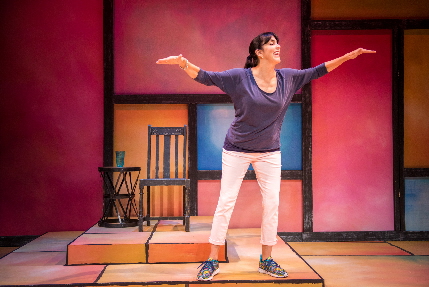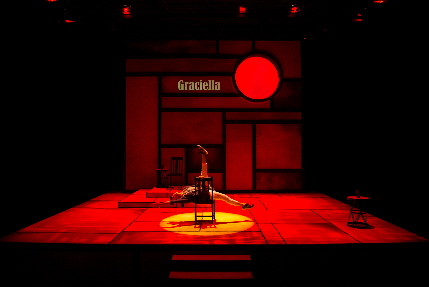
Elena Maria Garcia channeling one of more than 20 characters in Fuacata! / Photos by Justin Namon.
By Bill Hirschman
Fuácata!, now on its third production in South Florida, has been tweaked by its playwright-star Elena Maria Garcia and playwright-director Stuart Meltzer with references to Ariana Grande, non-binary, Uber and “draining the swamp.”
But the alternately exuberantly hilarious and profoundly moving work from 2017 already had elements that echo all the louder today since the rise of #MeToo, the hardening of ingrained bigotry, explosion of immigration crises, the renewed uproar over Cuba and a half-dozen other hot button topics.
Both as a badly-needed opportunity to roar with laughter and to think deeply about social issues, this production at Actors’ Playhouse is cause for celebration.
And, of course, it’s a welcome return of Garcia, one of the finest comic actresses in the region, portraying a kaleidoscope of more than 20 characters, guided by Meltzer, one of the finest directors we have in both comedy and drama.
But unlike similar shows by Lily Tomlin and Whoopi Goldberg, the denizens are woven into a plot, a narrative journey with underlying unifying themes. Fuácata! (Or a Latina’s Guide to Surviving the Universe), which originated at Zoetic Stage, is an expedition through the multi-cultural not-so-melting pot that is Greater Miami-Dade.
In a time when theater companies are being urged to “connect” with their community, every moment of the Garcia-Meltzer work is imbued with uniquely 21st Century Miami sights, sounds and peculiarities (the title is local Cuban-American slang for a back-handed slap of a wake-up call). The term Latina here accurately reflects our United Nations of heritages including Cuban, Puerto Rican, Mexican and Honduran.
But Fuácata!’s underlying strength is its connection to universal and transportable themes of retaining pride in heritage while finding a place in an assimilated world, coping with this insanely demanding and hectic society, and honoring the resilience of a diverse array of Hispanic women in the face of everything from prejudice to deprivation. As has been observed often in theater, as is noted about Fiddler on the Roof, sometimes by depicting something so culturally specific, everybody inexplicably see themselves. There is a silent, subtle reaching out here to both educate and bond with a non-Latin X community about the complexity of non-stereotypical Latinas.
To call Fuácata! a one-woman show would be dead wrong because Garcia’s heroine — the event planner, mother and Super Latina Superwoman Elena Flores — meets two dozen women during the business day we accompany her on. Garcia transforms instantly into those women so that the chameleonic actress is often holding conversations with herself.
But the heart of the work occurs when Garcia steps away from the Flores’ frantic funny odyssey to provide a dozen of the women with private storytelling monologues to the audience that reveal their backstory or inner challenges.
This is most poignant and pointed when Flores rolls down her car window to buy a bottle of water for a dollar from an anonymous down-on-her-luck woman she sees daily on a corner. Suddenly, the woman steps outside the action and talks to us: Her name is Marisol and she is a 17-year-old Honduran refugee from a political, social and domestic hell. Her quiet tale of being smuggled through a gauntlet of soul-scourging obstacles is deeply affecting in our current climate. But it also reminds us that every person we pass is a three-dimensional fellow human. These are the stories we read in the newspaper every week, but Marisol’s has profound impact because we hear it out of the mouth of a flesh and blood person.
These revealing interludes are integral to the play, but the majority of the evening is the mirthful work of one of the most gifted funny women that this region has been blessed with over the past 20-plus years. The three-time Carbonell winner and veteran educator melds the manic inventiveness of Robin Williams, the ability to inhabit distinctly multiple personalities akin to Tomlin, the endless collection of voices of Jonathan Winters, and the inspired physicalization of Lucille Ball. That’s not hype. Anyone can attest to that if they’ve seen her purloining the spotlight in any play she’s been in or portraying a panoply of characters in sketches shows such as Vanguard’s Parallel Lives. But her dramatic chops are equally on display here, the kind she gifted us with in Palm Beach Dramaworks’ The House of Blue Leaves.
The plot follows the arc of one day as Flores struggles vainly to find her staff of life “cafecito,” juggle a crucial business event that has suddenly mushroomed, and is drafted to chair the International Day food festival at her daughter’s school, Gloria and Emilio Estefan Middle School. In between, she deals with Miami traffic, a cop giving her a parking ticket, issues with her tradition-bound Mami and a host of all too familiar Miami memes.
In the highlight of the evening, Elena audits the sexually-charged act of Spanish performance artist Graciella that a condo senior wants hired for her 50th wedding anniversary. Posing in ludicrous contortions she thinks are sensual, Graciella plays with the audience and tells how she came on to her perfect lover, an IKEA clerk.
But also there’s Beatrice Goldberg, that kvetching condo senior survivor, who brays, “I have survived marriage to my husband Murray, that pain in the ass beside me, for 50 years. 49 of those glorious years I wanted to stab him in the throat with a dull fork.” She later says she had seven boys: “My house looked like an episode of Bonanza.”
There’s Monica, the first-generation Mexican-American mother who brings organic chicken-less matzo ball soup with spinach wantons and Brussels sprouts to International Day. She confesses to the audience that she “tried very hard to wash my heritage off my skin: I changed my hair color, wore lighter contact lenses, pronounced my name (American-sounding) Monica not (Spanish-sounding) Monica … When I walked into my old house, my mother welcomed me with these words:” “Mija, It seems like you’re still running. It must be so tiresome running all the time. But you run on emotion and with no compassion. If you keep running like that, mi amour, no one will know who you are. Not even you.”
Meet Sophie, the Millennial office assistant who judges her dates by the discounts they can score at their employment like Best Buy. She blithely shares, “Look, I’m not like the kind of person that shoots for the stars. That’s way too much work, like way too much planning, way too much of too much. I leave that to the big dreamers, those who want to change the world. I can’t even change a tire. That’s why I have A-A-A. Say what you want, but I’m a realist. I know my limitations. I’m okay with being a C on the grading scale.”
Most obnoxious is Sandy Holmes, the Anglo PTA president with barely-concealed bigotry, whose uncensored monologue warns us that immigrants “don’t have the American fighting spirit” and one of her educational goals is “we need to keep the ESOL students separate until they have mastered the English language.”
All this lands solidly in Garcia’s wheelhouse. Her elastic features, her inventively liquid body language, her torrent of varied voices with different rhythms fuse to create vibrant, easily differentiated characters and all driven by some indefatigable power supply that inexplicably triumphs through 90 intermissionless minutes. Her arms are like a tireless windmill with loose cooked spaghetti for blades. Hands flutter and fly, slash and slap all night – except pointedly for characters who stand quite still for their confessionals. Meltzer as director molded this into a disciplined work since the show is overflowing with hundreds of lighting and sound effects from Rebecca Montero and Anton Church, executed on Michael McKeever’s Mondrian-like set with precision by production stage manager Amy Rauchwerger and technical director B.J. Duncan.
By the way, while the play is shot through with musical Spanish phrases, Garcia usually either repeats the line in English or her performance makes the meaning crystal clear. But not always.
Buried under the humor, playwrights Meltzer and Garcia are like anthropologists reporting on a new country with finely observed glimpses of how people sound and act, and their relationships with strangers and loved one across generations and cultural differences.
It is suffused with subtle grace notes, especially about dealing with assimilation. Elena Flores speaks to us in a slightly-accented English, but her message on her business answering machine is delivered in classic neutral “American.”
One surprise is how well the show lands in a different venue. Fuacata! was perfectly at home in Zoetic’s black box theater benefiting from the communal closeness of the audience. But here the show is set in the Playhouse’s traditionally ample auditorium and wide stage. Plus the socially distanced audience is less likely to bond together in laughter. But Garcia’s magnetic charisma is so compelling and so engaging from the moment she steps on stage until she takes her curtain call that the show does not seem to suffer at all from its surroundings.
Granted, even the tweaked version still feels like it goes on a tad long, but Garcia is so winning that most people won’t mind.
The evening ends with an exhausted but fulfilled Garcia reflecting on the strength and admirable virtues of the Latina women she has interacted with. This may sound like a Lifetime movie finale, but in fact, Garcia has made her case and this is as much benediction as summation.
If you’ve seen the show before, a return visit is recommended. It is just as funny as you remember, but the more poignant passages seemed to have deepened. Or is it just that the world around us has changed.
COVID Info: Masks are required. The show is presented in the 600-seat mainstage theater with definite social distancing. Actors Playhouse has overhauled its air conditioning system and created touchless bathroom facilities. There are no playbills. Instead, patrons can download one before or after at https://www.actorsplayhouse.org/wp-content/uploads/2021/08/Fuacatashowbill_2.pdf.
Fuácata! (Or a Latina’s Guide to Surviving the Universe) through Sept. 12 at Actors’ Playhouse, 280 Miracle Mile, Coral Gables. Performances are at 8 p.m. Wednesday-Saturday, 3 p.m. Sunday. Running time is 90 minutes with no intermission. (305) 444-9293 or www.actorsplayhouse.org.










 A PaperStreet Web Design
A PaperStreet Web Design
